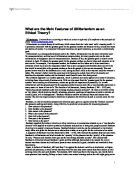The Hedonic Calculus weighs up the amount pain and pleasure caused by a moral action. He took into account various aspects of moral actions including an actions intensity, duration, the uncertainty or certainty of the outcome of an action; the propinquity or remoteness of the situation; the purity or chance of the outcome of the act being followed by another outcome (such as an outcome of pain followed by an outcome of pleasure); the chance or fecundity of the outcome being followed by the same outcome (such as a painful action being followed by another painful action) and in the cases in which it applies; the extent of the outcome, the number of people to which the action extends, for example the choice of sending two atomic bombs instead of one in Hiroshima by the USA can be argued to save more lives than it destroyed, as it scared Japan into submitting into the USA and ending that fight.
John Stuart Mill was a very intelligent theologian, who added to the utilitarianism theory. For Mill, the well being of an individual or a society was of the up most importance, and that the happiness of an individual is most effective when that individual is free to pursue their own will or end, but in limits to what gives the greatest good to the greatest number of people. For example, Hitler wanted to wipe out all “inferior” races, to come to his own means, or end, of creating a “super race” this was obviously what made him the happiest. However, left to pursue his dream, Hitler murdered millions of innocent people; this was not for the greater good of the greatest majority. Mill focused on qualitative pleasures, and stated that some pleasures are higher than others, like those mental pleasures would be seen as a higher sense of pleasure than physical pleasures.
Utilitarianism can be seen in to respects, there is “Act utilitarianism” and “Rule utilitarianism”.
Act utilitarianism maintains that the best action is the one that always leads to the greatest good for the greatest number in certain situations. For example, if in a certain situation where lying will create the greatest amount of pleasure, lying is what one must do. However, if lying would create a lesser joy than the truth, than the truth must be told, this is a teleological view. It is the value of the consequences of an act that one should take into account when making a choice. Act utilitarianism is flexible; it is able to take into account various situations. A critique of act utilitarianism is that it has the possibility to justify almost any act, if it creates the greatest amount of pleasure. We may not be information from the hedonic calculus in all situations, this means that our moral judgment of the situation will be flawed, and lead to extreme results in many cases. For example we can look at charity, if one were to donate all their spare money, or money not needed to maintain ones health and state of body, then they would have no money to spend on what they wanted, even though it benefits the greater good. The individual’s personal pursuit of happiness is drastically lessened.
Rule utilitarianism takes into account the course of action when determining the greatest good for the greatest number, by looking at what should be pursued by a whole community. In a certain situation the individual making the choice should make the one for the greater good, even if it doesn’t lead to pleasure for the individual. Further more, one should not lie, as it would not benefit the community. In each case the rule takes priority over the intermediate situation. Rule utilitarianism overcomes some problems of Act utilitarianism, such as in the charity example given earlier, the community has a rule to allow people time for leisure and the freedom to buy whatever they choose, therefore the complete donations is avoided. However it does prove a few more drastic difficulties, such as in certain practices, like slavery, that appears to be morally unacceptable, because minor interests are not protected, but as long as there are more masters than slaves it may seem that slavery is doing the greater good for the greater number. And this is obviously un-acceptable.
There are many problems with utilitarianism. How do you quantify happiness? And how do you spread out happiness? Some pain is good for us, just like some pleasure may be bad. The abuse of solvents gives one an instant high, which to some is pleasurable, but can be fatal, such as injections of medicine hurt, but the medicine administered may just save an individuals life. Utilitarianism fails to consider different views of happiness; only due to the practical dimensions of utilitarianism has it remained popular.







